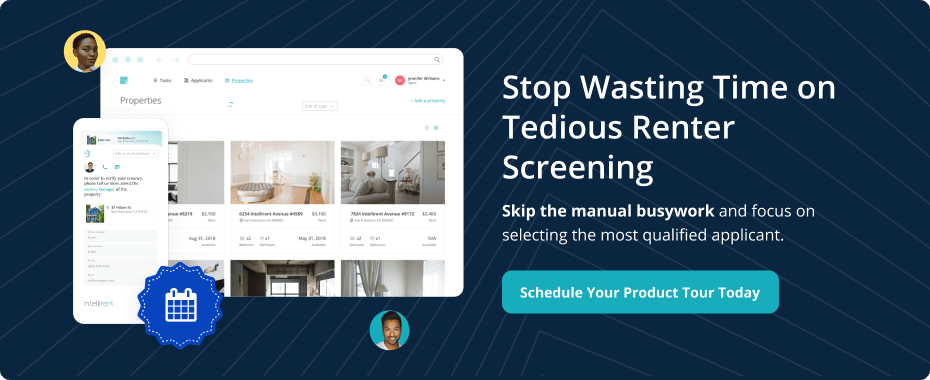June 27, 2023 • 6 min read

One bad renter can cost you thousands of dollars.
And not just from apartment damage or missed rent payments. A bad renter can cause other tenants to complain or move out and can cause lasting reputational damage that takes far longer to repair than any actual unit damage.
As a leasing agent, you know that tenant screening is crucial in finding the right renter and avoiding the above consequences. But, do you ever worry that you might overlook something important that could lead to a bad renter slipping through the cracks or feeling like you’re wasting countless hours processing applications?
Look no further! This article will guide you through the ultimate apartment screening process, so you can confidently screen and approve the most qualified applicants. From common mistakes to tips for improvement, we'll cover what you need to know to streamline your apartment screening process and save you time and money in the long run.
The Importance of a Robust Apartment Screening Process
You already know that renting to problematic tenants can lead to various risks, such as late rent payments, property damage, frustrated tenants, and legal disputes. If you own more than one property, multiply these potential risks by whatever that number is.
According to the National Apartment Association, an average of 9% of units are delinquent more than $5,000 per unit. That’s a significant risk to take on - even if you’re confident that 91% of your units are doing well.
Common Apartment Screening Process Mistakes
To ensure you find the most qualified tenants, avoiding common apartment screening process mistakes is important. Rushing the screening process is one such mistake, as it can lead to missing red flags. Take the time to thoroughly screen applicants to avoid missing any potential issues.
Not verifying information or checking for document manipulation can also lead to accepting false information or an ill-fitting renter. Checking past landlord or employment references can provide valuable insight into an applicant's character and rental history that is unlikely to be found otherwise.
Not using a consistent screening process can result in applicants being evaluated unfairly and inaccurately. And, simply looking at the credit score alone doesn't tell you everything you need to know about a candidate as credit history can provide valuable insight into an applicant's financial responsibility and ability to pay rent on time. Finally, not setting and communicating clear screening criteria can lead to potential discrimination issues and confuse applicants.
While you shouldn’t consider this an all-inclusive list, knowing some of the common mistakes in the apartment screening process can help build safeguards into your screening process to help avoid them.
The Ultimate Apartment Screening Process
A robust screening process offers a range of benefits, including mitigating much of the above financial risk. It can help improve your apartment community, leading to longer stays and fewer complaints/problems to deal with. It also helps you set clear screening criteria, avoiding any potential discrimination and ultimately leading to a better reputation for your business.
The following steps can help you streamline your process and ensure that you approve the most qualified applicants.
Step 1: Understand Your Apartment Rental Landscape
Before you can start screening tenants, it’s essential to understand the rental market and the needs of your potential renters. Research the market to determine appropriate rates for your property and area. Researching and understanding federal and local laws, including fair housing regulations, is vital to establish a fair screening process for all.
Knowing your market will help you set realistic expectations and standards for your ideal renter while also communicating your minimum requirements to them. Speaking of communicating rental criteria…
Step 2: Determine & Communicate Your Ideal Renter Criteria
Knowing what you’re looking for in a renter can help you narrow down your applicant pool and save time in the screening process. Set your ideal criteria, such as credit score, rental history, pets, and income, and communicate it early and clearly to all prospective renters.
We recommend including your criteria as a part of your in-person or online application, posting expectations in public spaces (gyms or clubhouses) or sending regular digital communications to keep everyone on the same page.
Step 3: Collect Rental Application & Validate Documentation
Online rental applications can make the screening process more efficient and secure. They allow applicants to quickly submit correct documentation and answer questions, saving time for both parties.
Tenant leasing and screening software often offer built-in capabilities to check for inconsistencies or potentially fraudulent information, including identity and employment documentation. Using these types of software lets you validate that documents quickly and efficiently, increasing the speed and accuracy of your approval process.
One such software is Intellirent. Our Leasing Tools facilitate and automate every step of your screening and leasing process, helping leasing agents fill vacancies in under 24 fours.
Step 4: Always Request a Credit Report
A credit report can provide valuable information about an applicant’s financial history. Collecting credit information gives you confidence that a potential renter is good for their monthly payment - or raises a red flag if they’re not.
Use an online service to get a credit report directly from the bureaus. And make sure you get the whole report–not just the credit score–for deeper insights into that person’s habits and lifestyle.
Intellirent partners with Transunion to instantly provide credit reporting and background checks. We trust Nova Credit to provide background checks for new or international renters outside the United States.
Step 5: Verify Income & Employment
Similar to credit reporting, verifying a potential renter's income and employment is another way to ensure you’re putting a qualified person in your residence. Whether they have a regular 9-5, run their own business, or even “retired” at 25, you can save yourself potential trouble by thoroughly vetting each applicant.
Step 6: Verify Rental History
Just because someone has a reliable income or is a good employee doesn’t necessarily mean they’ll be a good renter. That’s why checking rental history is another critical step in the screening process.
Past evictions or criminal may come up in background checks, but verifying from the source ensures you get all the relevant information. Communicate with past landlords to ensure that there were no problems with the tenant and they would be a valuable addition to your community and culture.
Step 7: Review Application Questions & Documentation
Once you have all the documentation and verifications, carefully read through the applicant’s responses to your questions and ensure that all data aligns. Compare applications against the ideal renter criteria you set in Step 2 and approve the first qualified applicant.
Keep track of when complete files were obtained to ensure that you are fairly comparing against potential renters who submitted in a timely manner. This gives all qualified applicants a fair chance at the selection and eliminates any chances of unconscious bias that could get you in trouble down the road.
3 Tips to Improve Your Apartment Screening Process
Following these steps is helpful, but how you accomplish them is equally important. Here are three tips to help you improve your apartment screening process:
- Be Consistent
It’s crucial to screen every applicant every time, using the same procedures and identical applications. Don’t make exceptions and ensure you follow the same tenant screening process. This will help you remain unbiased and maintain high objective screening standards. Renters want fair treatment. The more consistent your apartment screening process is, the more likely you are to attract renters who share those values.
- Utilize Online Application Processes
Using an online application can save you a lot of time and effort. Applicants can fill in their information online, and you can access it from anywhere. In addition to time-saving, online applications are also more secure and streamlined. Access applications, documentation, and references in one convenient place, making it easier for you and applicants to track your progress during the evaluation process.
- Leverage Tenant Screening Technology
Using tenant screening technology can significantly improve your leasing process by saving time, reducing errors, and attracting more qualified applicants. Advanced screening tools can automate the verification process and identify fraudulent documents, ensuring that all application data is accurate and reliable. By streamlining the screening process, landlords can quickly identify qualified applicants and make informed decisions, leading to better leasing outcomes.
Optimize Your Screening Process with Intellirent
As a leasing agent, thorough applicant screening is vital to avoid problematic renters. To streamline the screening process and ensure qualified tenants, it is important to understand the rental market, communicate rental criteria, collect rental applications, always request a credit report, and verify income and employment. Utilizing screening software can increase speed and accuracy.
A robust screening process leads to numerous benefits, including mitigating financial risks, improved apartment community, and a better reputation for the business. Having the right screening tool to help you achieve your business goals is key.
Intellirent, for example, offers a suite of leasing tools that provide customizable rental applications, online document signing, and real-time data integration, making the entire leasing process more efficient and effective.
Don't waste countless hours processing applications and risking bad renters slipping through the cracks. Book a product tour today and see how Intellirent can help you confidently screen and approve the most qualified applicants.
Published by Cassandra Joachim
June 27, 2023
Related Articles
August 22, 2023 • 5 min read
June 13, 2023 • 5 min read
Subscribe For Insights
Get actionable leasing tips, tools, and best practices directly to your inbox. Don't miss out on the insights that'll help your team confidently find, screen, and approve the most qualified renters.


